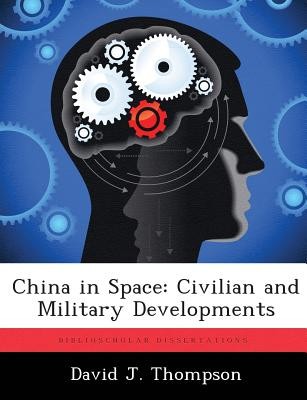
- We will send in 10–14 business days.
- Author: David J Thompson
- Publisher: BiblioScholar
- ISBN-10: 1288325932
- ISBN-13: 9781288325931
- Format: 18.9 x 24.6 x 0.2 cm, minkšti viršeliai
- Language: English
- SAVE -10% with code: EXTRA
Reviews
Description
On 8 October 1956, the Central Committee of the Communist Party of China, presided over by Mao Tse-tung, established the Fifth Research Academy of the Ministry of National Defense to develop a space effort. This was the official beginning of the People's Republic of China (PRC) space program. Just four years later, on 5 November 1960, China launched its first rocket becoming the fourth country behind Germany, the United States, and the Soviet Union, to enter space. The Chinese space program has survived periods of traumatic upheaval during its 44-year history. Today, space is the cornerstone of China's national science and technology development effort. Beijing is advancing China's space program on a number of fronts hoping to become a recognized international space power. The Chinese leadership under Jiang Zemin wants China to become a strong, modern, and ultimately wealthy nation, in short a great power. Given its natural resources, manpower, nuclear forces, seat on the UN Security Council, and growing economy, China wants parity with other great powers. To do this Beijing has crafted a national development strategy led by certain sectors. The purpose of this paper is to discuss how China's space program aids the government in reaching for great power.
EXTRA 10 % discount with code: EXTRA
The promotion ends in 21d.05:25:31
The discount code is valid when purchasing from 10 €. Discounts do not stack.
- Author: David J Thompson
- Publisher: BiblioScholar
- ISBN-10: 1288325932
- ISBN-13: 9781288325931
- Format: 18.9 x 24.6 x 0.2 cm, minkšti viršeliai
- Language: English English
On 8 October 1956, the Central Committee of the Communist Party of China, presided over by Mao Tse-tung, established the Fifth Research Academy of the Ministry of National Defense to develop a space effort. This was the official beginning of the People's Republic of China (PRC) space program. Just four years later, on 5 November 1960, China launched its first rocket becoming the fourth country behind Germany, the United States, and the Soviet Union, to enter space. The Chinese space program has survived periods of traumatic upheaval during its 44-year history. Today, space is the cornerstone of China's national science and technology development effort. Beijing is advancing China's space program on a number of fronts hoping to become a recognized international space power. The Chinese leadership under Jiang Zemin wants China to become a strong, modern, and ultimately wealthy nation, in short a great power. Given its natural resources, manpower, nuclear forces, seat on the UN Security Council, and growing economy, China wants parity with other great powers. To do this Beijing has crafted a national development strategy led by certain sectors. The purpose of this paper is to discuss how China's space program aids the government in reaching for great power.


Reviews